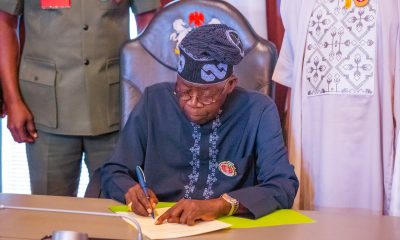Business
Tinubu’s CNG Initiative Promises To End Era Of Buying Fuel At ₦750 Per Liter

The Nigerian government has announced that the days of purchasing Premium Motor Spirit (PMS) at prices between ₦750 and ₦1000 per liter are over.
Naija News reports that this comes as the government prepares to commission 30,000 Compressed Natural Gas (CNG) powered vehicles within the next 90 days.
The Project Director and Chief Executive Officer of the Presidential Compressed Natural Gas Initiative, Michael Oluwagbemi, made this announcement during the Park to Park CNG Mobilisation program held at Ojota Park in Lagos on Saturday.
Oluwagbemi revealed that the initiative would cost ₦36 billion, covering the distribution of 30,000 CNG conversion kits free of charge nationwide within the next three months.
Each kit and the associated conversion costs are valued at ₦1.2 million per vehicle, totalling ₦36 billion for the project.
He emphasized that this initiative aims to promote the adoption of CNG as an alternative fuel for transportation.
“Today, we are here with conversion kits. We have purchased over 30,000 of these kits for distribution within the next 90 days.
“The President has instructed us that this initiative will not stop at 30,000 kits. The target is one million kits. We want to ensure that everyone can benefit from this government initiative.
“The era of buying fuel at ₦750, ₦800, or ₦1000 per liter is over. We will start using the gas under our feet so that we can purchase it at ₦230 per kilogram,” he stated.
This initiative follows President Bola Tinubu’s directive for all Ministries, Departments, and Agencies to procure CNG-powered vehicles as a measure to mitigate the impact of the fuel subsidy removal.
Naija News earlier reported that the Nigerian National Petroleum Company Limited (NNPC) announced a significant shift towards Compressed Natural Gas (CNG) as a cheaper and more sustainable alternative to Premium Motor Spirit (PMS), commonly known as petrol.
NNPC unveiled that the use of CNG in automobiles offers a 40 percent cost reduction compared to petrol.












